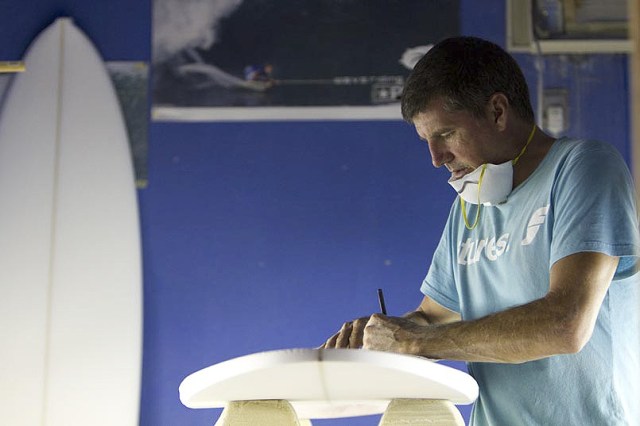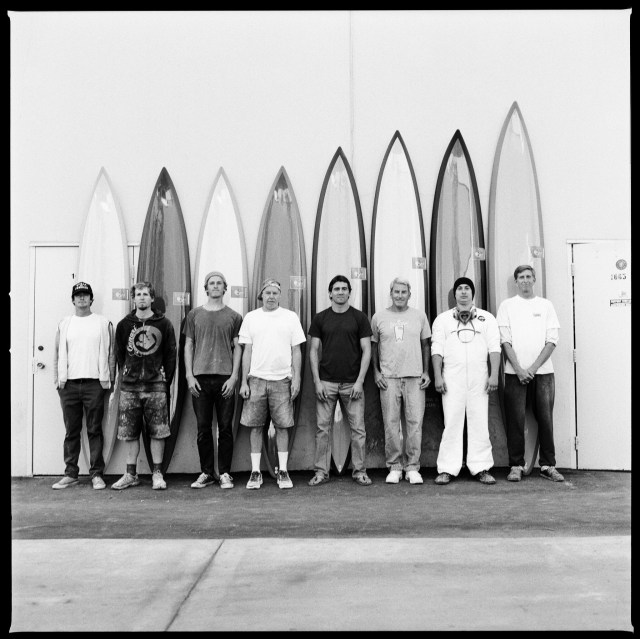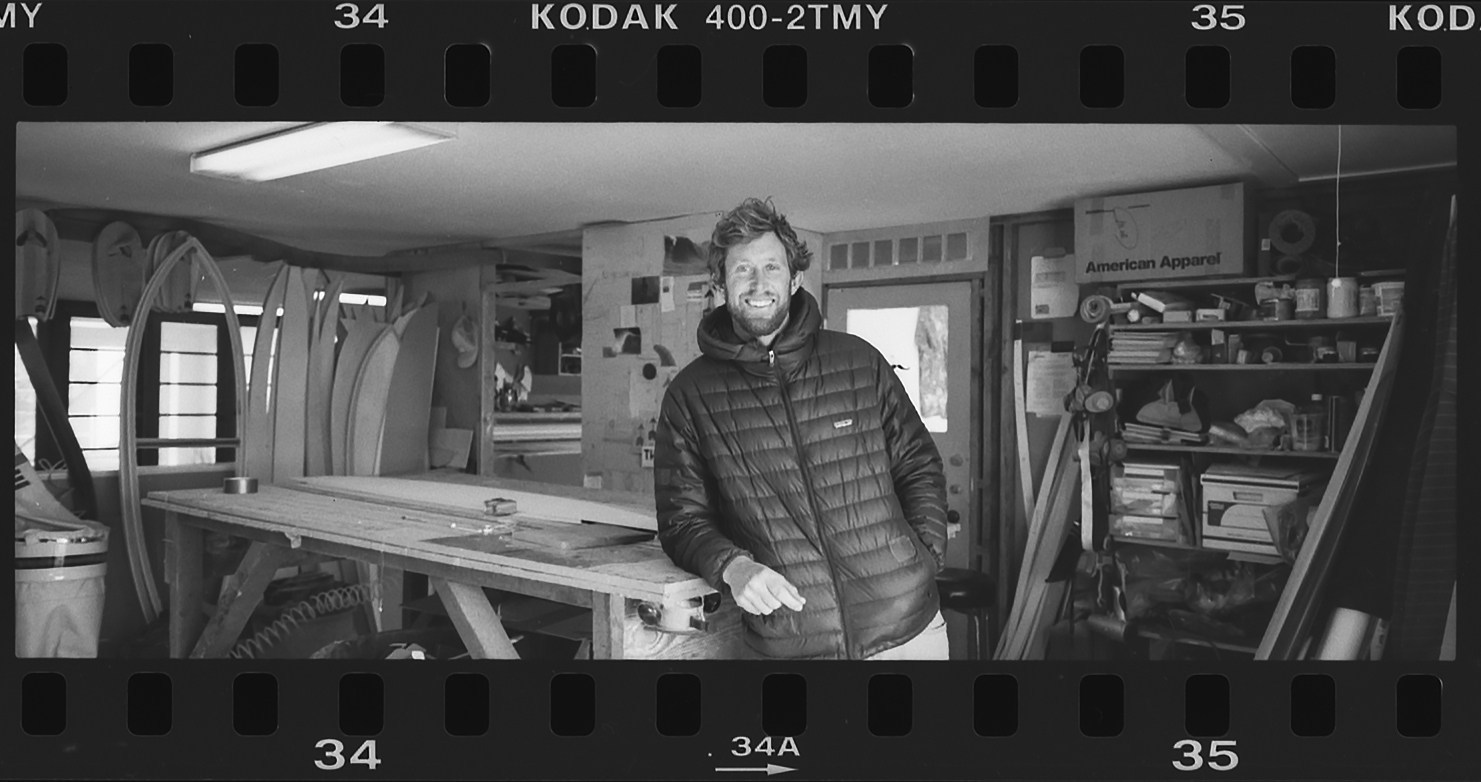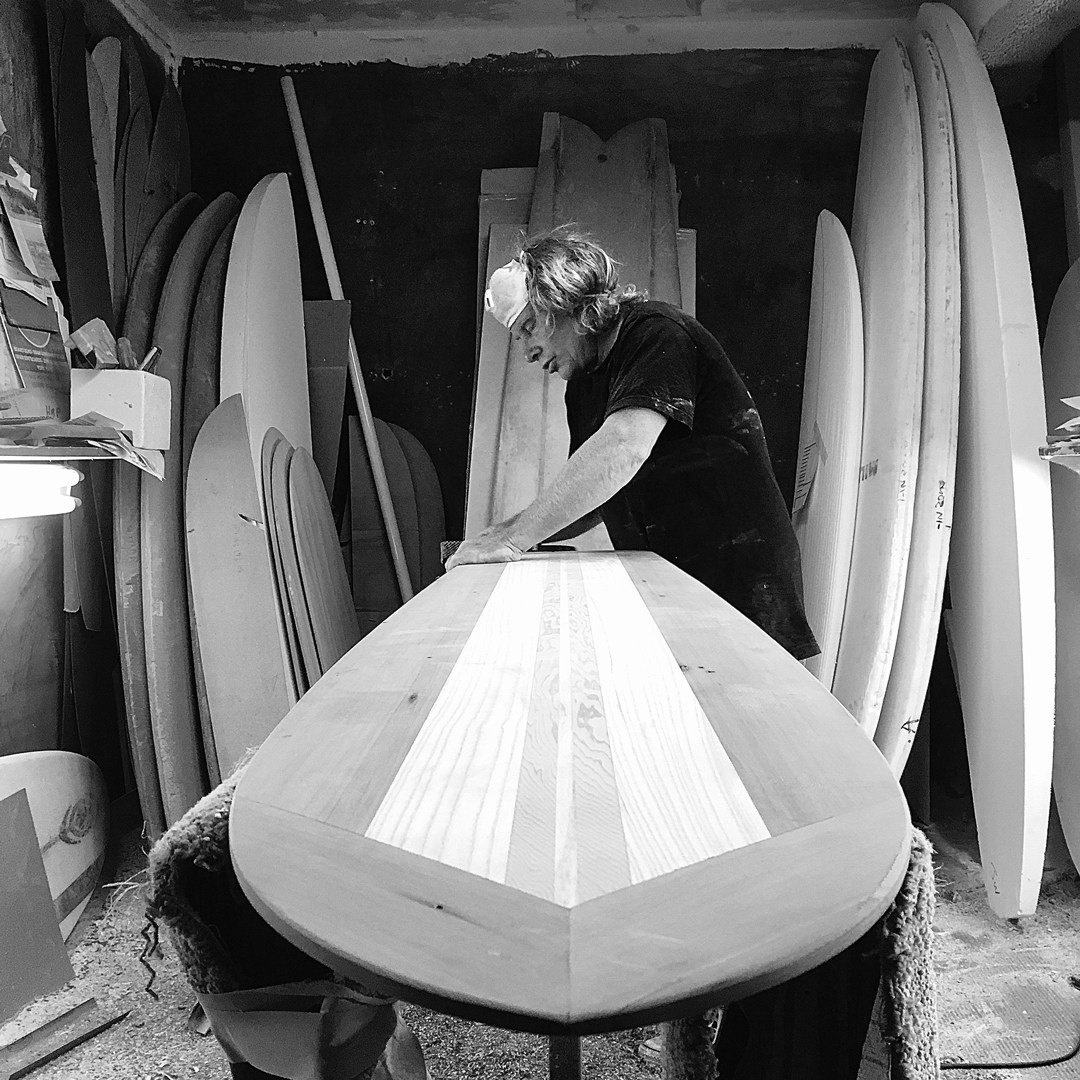On a trip to Hokkaido, Japan, in late February, shaper Jon Pyzel saw the writing on the wall. On the day he and his wife Dali arrived, the province’s governor declared a state of emergency, after a snow festival earlier in the month led to an outbreak of coronavirus. Schools closed, businesses shuttered, streets became deserted, and Pyzel witnessed firsthand how quickly the spread of the new coronavirus could paralyze daily life.
“When we came home we felt the need to self-quarantine already just to be cautious,” says Pyzel, who lives and works on Oahu’s North Shore. “Soon after that we said, ‘You know what, we’re going to shut this down.’” On March 15, they stopped letting people into the retail store that connects to their factory in the Waialua Sugar Mill and implemented safety measures among their factory crew. They tried to keep everyone working as long as possible, but the risk eventually outweighed the reward. “We were balancing the value of keeping people working versus keeping people healthy, so we shut the whole operation down before anybody told us we had to.” Pyzel Surfboards furloughed 10 of its employees.
Jon Pyzel closed his retail shop and factory before the state of Hawaii mandated him to do so.
In San Clemente, California, Matt Biolos of …Lost Surfboards was also ahead of mandatory precautions. “Ten days before Newsom shut down California, we already put up signs all throughout the factory, and I told all my workers they had to put their masks on before they came in the factory, no one was allowed to loiter, don’t take masks off until you leave, we gave every employee hand sanitizer,” says Biolos. “We made our own social distancing guidelines.” As soon as California Governor Gavin Newsom gave the order to shut down, Biolos laid off three dozen employees spread among his shaping, fulfillment and glassing facilities. By the time Florida had shut down and Biolos’ three retail shops there closed, the total number of employees he had let go neared 60.
“Within a few hours, we’d given all our employees access to unemployment,” says Biolos, “and then I didn’t sleep for three days.” Chris Christenson felt a similar stress in letting go 15 of his employees from Christenson Surfboards in San Marcos, California. “I had to lay off my entire crew,” says Christenson. “It was hard but at least then they could collect unemployment.” (Christenson subsequently donated over 100 N95 masks from his factory to healthcare workers.)
Christenson and staff with Greg Long, eight years before coronavirus brought Christenson Surfboards to a screeching – albeit temporary – halt.
With the majority of their staff gone, it was now up to these surfboard makers to figure out how to make their businesses survive the economic cataclysm caused by the coronavirus pandemic. Their business models depended heavily on selling surfboards through retail shops, many of which have been forced to close their brick-and-mortar locations. “Any shop we sent boards to in the last 30-60 days, we’re not getting a check for,” says Pyzel. “Everything we have out, we already paid for, we built, shipped it, paid the employees, but we aren’t getting paid for it.” Even the most reliable, longstanding accounts were unable to pay when they couldn’t make sales themselves.
…Lost Surfboards only sells through shops, and Biolos is seeing a 95 percent decrease in business. This blow is compounded by the amount of overhead an operation of …Lost’s size demands. With a shaping facility, a shipping and receiving warehouse, two glassing facilities, two retail shops in San Clemente and three in Florida, the income may have paused but the costs have not. “We have $25,000 a month’s rent in San Clemente, and I have no money coming in,” says Biolos. “We shipped out 1,000 surfboards in February and early March…they’re all sitting in storage across America. So I gotta pay my blank bill, my outside glass shops, I already paid all my workers, I gotta pay $25,000 in rent, and my landlords are saying ‘F*ck you, pay me.’”
Like most businesses across America, the economic shutdown has demanded a rapid pivot in strategy for some shapers in an effort to generate some kind of revenue. For Pyzel, this has meant leaning into an e-commerce strategy that is normally more subdued, out of deference to the surf shops with which he has accounts. Pyzel Surfboards is offering free shipping, a traction pad and a hat with online orders, and they’re seeing an uptick in online sales that is helping to keep the company alive. “We’re just trying to pay our rent,” says Pyzel. “We don’t want to screw the shops. We’re not going to try to push sales to us forever.” His custom orders have also increased, and he is making boards at what he calls a “record speed turnover,” with only one employee working in the factory per day.
Biolos and Christenson, however, seem resigned to wait out the closure rather than squeeze blood from a turnip. …Lost’s Instagram is pushing archival surf films from the “Lost Video Vault,” rather than slinging surfboards. “We’re just entertaining,” says Biolos. “The only marketing we’re really doing is helping shops trying to still sell our boards.”
While Christenson had a couple of accounts request more boards, he’s decided to keep his 10,000 square-foot factory closed not only to protect his bottom line, to allow his workers to collect unemployment and to shield against liability, but also to do his part to stave off a health threat he considers a legitimate threat to the public. “The wording is ‘essential businesses only,’ we are no more essential than these other non-essential businesses that have had to close,” he says. “I feel it’s our social responsibility.” Christenson’s business was also in a position where he could absorb the impact of a temporary freeze. “We just came off the best economic times perhaps of our lifetimes. So shutting down for a month, does it hurt? Yeah, but it’s not going to destroy my company,” he continues. “Now, if this goes into May, June, July, I’m going to start sweating a lot more.”
For surfboard shapers with smaller operations, adjusting to the new not-normal can be simpler. Danny Hess in San Francisco, California, has had to change his schedule and slow down production, but he’s still shaping almost every day. San Francisco was the first major city in California to shut down, and its residents largely took the mandate seriously. Hess shares a showroom/workshop in the Outer Sunset with four other craftsmen, and they collectively agreed that none of them would use the space at the same time. They created an online schedule where they can sign up for “shifts,” and to accommodate everyone, some of the shifts are in the early morning hours or late at night. There’s an hour-long window between each shift, and each user is required to disinfect door handles, light switches and tools before and after working.
The new system has forced Hess to reduce his hours from what was typically 50 hours in the shop a week to 30. Still, since Hess’ business is almost completely custom boards, he’s been able to keep working through his backlog of orders. When the stay-at-home orders were issued, Hess had just finished a batch of 15 boards. “I contacted the clients and right away they responded that they all did want the boards.” says Hess. “I had my fingers crossed, I thought I was going to hear crickets.” Hess is shipping many of the boards that would otherwise have been picked up in person before social distancing. He misses the interaction that used to be a part of his business, when clients would stop by the shop in person to plan the design of their board. “That part has been weird but not insurmountable, especially with what everyone else is going through,” he says. The relative stability of his business has freed Hess to look after his customers who may have been hit harder than he. When a longtime customer told him he couldn’t pay right now for his recently finished board, Hess told him to come pick it up, and finish paying for it in a couple months. (This week, Hess also auctioned off a 10’2″ gun made from Redwood for $4,000 to benefit a Bay Area food security nonprofit.)
Hess, in his shaping by before the COVID crisis
In Encinitas, California, Jon Wegener stopped shaping in the space he rents from Bing Surfboards and moved his operation to an isolated location. It was important to his wife that they take social distancing seriously, so there wasn’t much deliberation over whether to keep going to the factory. By coincidence, Wegener had just been handed down a vacuum system, which has enabled him to mitigate the toxicity of working with foam in his temporary facility. But it’s been an adjustment to work with the vacuum, which requires that Wegener move around and operate his electric planer with a vacuum hose attached. “I’d never really seen anyone else’s system, so it’s been an adventure.”
The larger adjustment, however, is realigning his business strategy. Wegener’s business took a hit from shop closures, so while he has no employees and a modest rent payment, he’s struggled with whether to wait out the storm, or make a concerted effort to appeal to his following. “The big change is which customer base should I try to appeal to,” he says. “Only the fortunate people can keep ordering surfboards. It’s just kind of weird to ask people to buy something they don’t need. But a lot of people can still afford it, so you just have to keep moving.” As custom orders have slowed down significantly compared to this time last year, Wegener has put more emphasis on his wood craft – alaias and paipos – as they’re less expensive and appeal to a niche, loyal customer.
While it’s easy to assume a slowdown could be taken advantage of as a time to shape without interruptions, the realities of the situation largely prohibit that. For smaller operations, there may not be enough money coming in to buy a batch of blanks, and for larger ones, it might not make sense to produce a stockpile of boards when there are already hundreds sitting in closed down shops.
And like so many businesses across the country, surfboard makers are experiencing a tug-of-war between keeping their businesses alive and accepting their classification as non-essential. Which can be difficult to do when the demarcation between essential and not does always seem logical. “There are so many loose ends and so many sloppy people being able to keep their businesses running which are 10 times more dangerous than my business,” says Biolos. “Frozen yogurt, Baskin Robbins, $30-a-plate restaurants serving cocktails on their front porch and delivering filet mignon in to-go boxes, come on. You’re not essential.”
On the other hand, there is a general acceptance that surfboards are also not essential. “The conflict for me is, there are more important things than surfboards,” says Wegener. “That’s interesting to hear from a guy who really all he is is a surfer, but it’s not the most important thing. So I feel weird pushing it as a super necessity. I’m asking people to buy my boards who are better off than other people, and those people should probably be helping people who are less well off with things that are more important than surfboards.”
Jon Wegener has shifted focus to his wooden surf craft, appealing to a niche and loyal customer base.
When asked if he has any qualms with continuing to ship boards when shipping industry workers are fighting for worksite safety and paid sick leave, Pyzel acknowledges there is no perfect solution. “It’s definitely a moral tug of war,” he says. “Do I wonder if I should just stay home and not do anything at all, not send a surfboard anywhere…it’s tricky.” With most of his employees furloughed, Pyzel is shipping many of the orders by himself. “I just try to take the safest precautions, like wearing gloves and wiping down boards with diluted bleach when we pack them, but it’s still questionable.”
As far as what the future holds, while there is optimism that things will pick back up as the virus recedes, there is also an acknowledgment that the surfboard landscape won’t look exactly the same as before, for better and for worse. At the beginning of the economic shutdown, it may have seemed like the coronavirus would be an exercise in economic darwinism, where the best prepared and fittest would survive. But as states consider extending stay-at-home orders to two months, or perhaps even longer, even the strongest businesses may emerge from the shutdown seriously crippled. “We talk every day about how to downsize,” says Biolos. “If you’re not talking about how to restructure your business with a smaller economy, then you don’t deserve to be in business.”
The fear is that even when we are all free to go back to work, to frequent public places, to eat out, shop, gather, and yes, to surf, there will still be an air of cautious restraint affecting people’s behavior, and their purchasing decisions. Says Biolos, “I think it’s going to climb back, it’s not going to bounce back. People are going to want more of a nest egg. We’re all getting caught up the creek without a paddle.”
Still, the allure of a new surfboard is a time-tested temptation that is impervious to any virus. For those who want to – and are able to – help keep their favorite surfboard makers above water, their custom orders will be welcomed right now. Even putting a deposit down for a future order can be a boost for some shapers. “It can help them for a period of time,” says Hess, “and it gives shapers a sense of security that ‘Hey, this person is going to come back.’” And surely, customers will come back. “The beautiful thing about being a surfer is you always want a new surfboard,” says Pyzel. “I’m going to make myself a new board tomorrow.”
Original Post from this site




